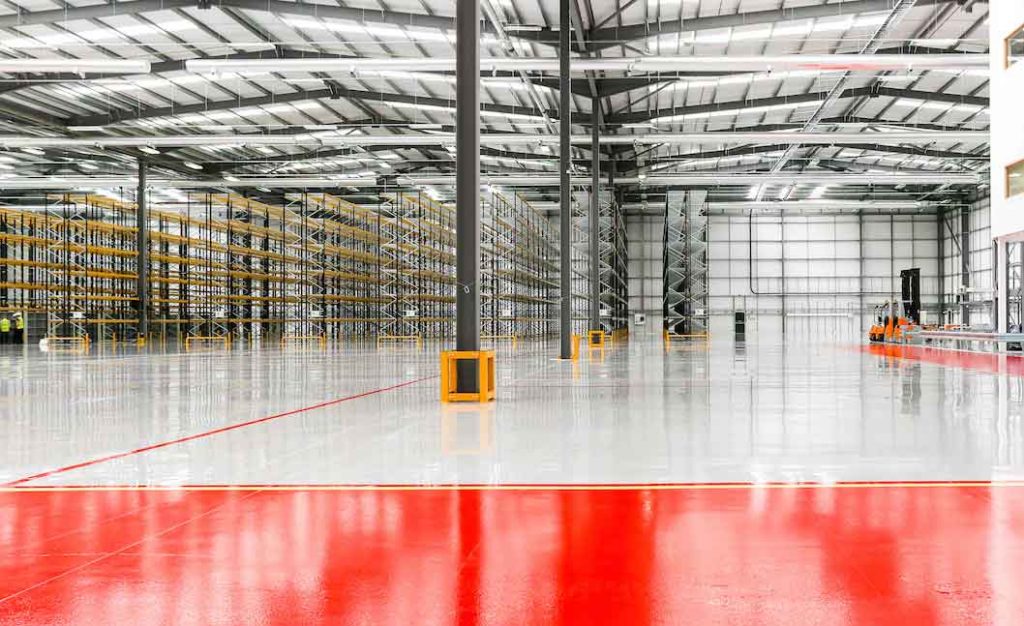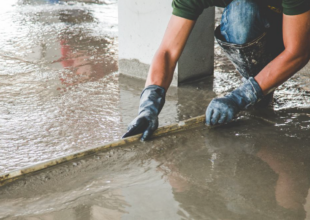
Improve the Standard of Your Warehouse From the Ground Up
Dilapidation work is an important consideration for both tenants coming to the end of a lease agreement and landlords preparing to re-market a commercial or industrial building as for both it can result in costs, prolonged labour, operational downtime and potentially unforeseen expenditure.
The focus of dilapidation works might be different for each party, as the tenant is looking to avoid breaching the terms of their contract and the landlord wants to quickly return the property to an as-new state so that it is ready for market as soon as possible.
One of the largest areas of concern for landlords is the floor, as it is invariably the part of the building that has weathered the most use and abuse. The floor finish of an industrial site such as a warehouse or factory is likely to have been exposed to impacts from heavy machinery and spillages of corrosive liquids such as oils or greases, while large-scale commercial spaces will have regularly subjected the floor to heavy foot traffic, frequent hot water washes and cleaning chemicals.
With tenants becoming increasingly aware of the importance of having a good quality floor surface, that is both fit for purpose and also visually pleasing for staff and visitors, more of an emphasis is placed on the landlord to ensure that this area of the site is prepared accordingly, to avoid the risk of losing potential clients.
Bringing a facility up to the standards expected by potential tenants is only half of the challenge, as the site should also meet the health and safety regulations relevant to its future use.
In storage areas, floor flatness requirements are critical, especially when dealing with high ceilinged spaces and tall shelving, where the safe operation of high-lifting equipment is paramount. Flat floors decrease vibration on forklift trucks, and so reduce the need for repairs and subsequent down time. Health and safety is increased while the risk of damage to stock is decreased with a lower chance of racks collapsing as a result of uneven surfaces.
Epoxy resin floor coatings have become a popular choice for warehouse and distribution centres, thanks to the ability of these solutions to provide a robust, level platform that can withstand onsite challenges for an extended period of time whilst providing additional operational benefits. One such epoxy resin floor coating that is especially popular in warehouse areas is Flowcoat SF41 from Flowcrete UK.
Systems such as the cement-based, pump applied topping Flowscreed Industrial Top can be specified to work alongside an epoxy coating to create a level surface prior to the application of the resin. This build-up helps to further enhance the surface regularity, and by extension, the operational effectiveness of the entire floor area.
The ability to include customisable additives means that FeRFA Type 3 rated resin finishes such as Flowcoat SF41 will not only revitalise the floor’s surface but can also add valuable benefits to the site that could appeal to potential tenants.
For example, the levels of slip resistance can be tailored to specific areas of the space. This is achieved by varying the quantity and size of the aggregates that are incorporated into the resin material to provide extra traction underfoot precisely where it is required.
Ultra durable epoxy solutions such as Flowshield SL can be chosen for the most challenging locations. This exceptionally hard wearing, self-smoothing resin floor finish is ideal for landlords who want to reduce the frequency of upgrade works as much as possible.
Its dependable, colourful and multi-functional finish makes Flowshield SL suitable for even the most heavy-duty industrial environments. High-end manufacturers Rolls Royce chose this floor finish for these qualities, as it was incredibly important to have materials that maintained an aesthetically attractive and hygienic environment despite the site’s intensive activity.
Epoxy systems have a proven track record of use in high-end industrial and warehouse facilities around the world, including at a large pharmaceutical warehouse at Heathrow Airport, for logistics giants Howard Tenens, at Royal Mail depots, Ryanair’s Prestwick hangars and Bentley Motors production headquarters.
These epoxy systems can be complemented with thick polyurethane floors in areas where there is likely to be more heavy duty operations, such as in loading bays or areas where very heavy machinery will be placed.
Landlords and tenants can take advantage of the life cycle cost savings of resin floor solutions to minimise maintenance and refurbishment costs in the future. Thanks to the long lasting nature of systems such as Flowcoat SF41 and Flowshield SL, the initial outlay can be divided into many years of reliable service, meaning that costs are reduced over the long term when compared to cheaper but more failure prone alternatives.
Credits
Our latest news
For the latest news on FeRFA, its members and the industry.




